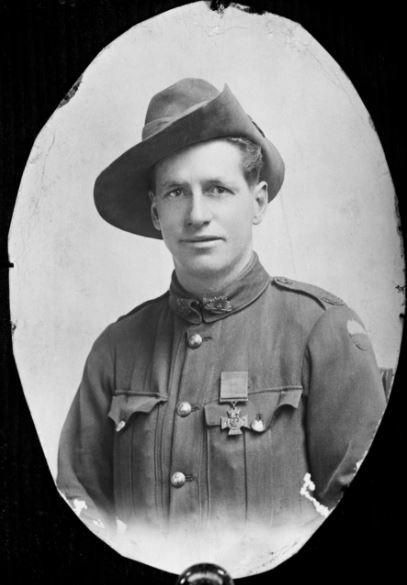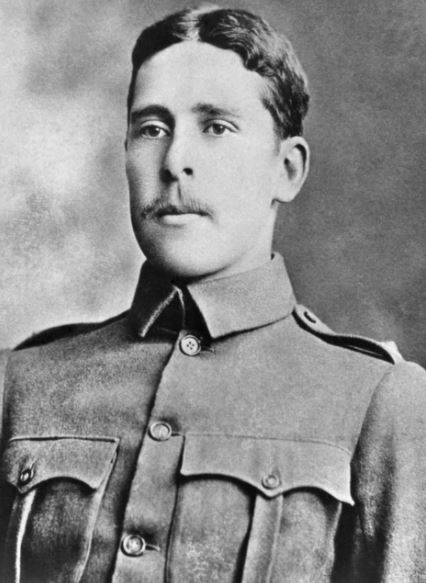Private James Park Wood VC (1886 - 1963, 77yo)
 James Woods was born on 4 January 1886 in Two Wells, South Australia. Orphaned at a young age, he was raised by his step-sister and worked alongside his brothers on a vineyard to help support the family. At the outbreak of the First World War, Woods attempted to enlist but was repeatedly rejected due to his short stature. Undeterred, he travelled to Western Australia and continued his attempts. He was finally accepted for service on 29 September 1916, after height requirements were reduced. He was posted to the 48th Battalion as a reinforcement.
James Woods was born on 4 January 1886 in Two Wells, South Australia. Orphaned at a young age, he was raised by his step-sister and worked alongside his brothers on a vineyard to help support the family. At the outbreak of the First World War, Woods attempted to enlist but was repeatedly rejected due to his short stature. Undeterred, he travelled to Western Australia and continued his attempts. He was finally accepted for service on 29 September 1916, after height requirements were reduced. He was posted to the 48th Battalion as a reinforcement.
On 18 September 1918, during the assault on the Hindenburg outpost line near Le Verguier, north-west of St Quentin, the 48th Battalion captured its objective. However, when British troops on the flank encountered resistance, a company of the 48th was sent to assist. While on patrol, Woods and two fellow soldiers located a heavily armed German position consisting of six machine-guns and more than thirty troops. Without waiting for the larger assault force to arrive, Woods led his small team in an audacious attack. One enemy soldier was wounded, another captured, and the remainder fled the position.
Shortly after, the Germans launched a counter-attack. Under intense fire, Woods climbed onto the parapet and, lying exposed, repelled the enemy by throwing grenades supplied by his comrades. His determined defence allowed Australian reinforcements to easily secure the position. For his bravery and leadership, Woods was awarded the Victoria Cross.
He returned to Australia in August 1919 but suffered from ongoing health issues related to his wartime service. In 1937, he was granted a full pension and, though initially given only a few years to live, he went on to enjoy a peaceful retirement for the next 26 years. James Woods passed away on 18 January 1963 and was buried at Karrakatta Cemetery.
Major Guy George Egerton Wylly VC, DSO (1880 - 1962, 81yo)

Guy Wylly was born in Hobart, Tasmania on 17 February 1880. He enlisted in the military and departed for South Africa on 26 April 1900 as a Lieutenant with the 3rd Tasmanian Contingent. Upon arrival, his unit was integrated into the 4th Imperial Bushmen.
On 1 September 1900, while commanding a troop escorting a foraging party near Warmbad in the Transvaal, Wylly and seven others rode ahead to scout and encountered an ambush in a narrow gorge. The group came under heavy fire and six men were wounded, including Wylly himself. During the engagement, Corporal E.S. Brown was shot in the leg and thrown from his horse. Wylly, despite his own injuries, went to Brown’s aid, gave him his horse, and provided covering fire from behind a rock. His actions enabled Brown and others to withdraw safely before Wylly also managed to escape.
For his bravery, Wylly was awarded the Victoria Cross. Notably, Trooper J.H. Bisdee was also awarded the Victoria Cross for his actions during the same encounter.
Following the Boer War, Wylly continued his military career with the Indian Army, eventually rising to the rank of Colonel before retiring in 1933. During the First World War, he served as a staff officer and spent part of his service attached to Australian formations. In recognition of his contributions, he was awarded the Distinguished Service Order in 1918.
Wylly retired to the United Kingdom, where he lived until his death in 1962.
Last Reviewed 06/2025









